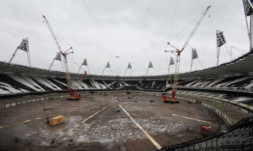UK construction firm Balfour Beatty slumped to a £304 million pre-tax loss as its new chief executive warned of “major short-term challenges”.
Balfour also announced a fresh £118m write-down on its UK construction business to add to the £70m hit disclosed in January.
The group issued a series of profit warnings in 2014 and former chief executive Andrew McNaughton departed in May with his successor Leo Quinn starting two months ago.
Mr Quinn said: “Balfour Beatty’s underlying performance has been declining since 2010, with the sharpest and most noticeable decline occurring over the last 12 months.”
Balfour’s major projects include a £154m contract awarded last year to convert London’s Olympic Stadium into a multi-use venue which will host 2015 rugby World Cup matches before becoming the home of West Ham United.
The group reported an underlying annual pre-tax loss of £80m, down from a £131m profit a year before.
Its bottom-line figure was dragged further into the red by losses on certain “legacy” engineering services contracts as well as from the German rail business it is in the process of selling.
A year before Balfour made a statutory loss of £49m.
It was also weighed down for 2014 by the costs of an aborted proposed merger with Carillion as well as restructuring and reorganisation charges.
The performance of the UK construction business was the main drag on group earnings, as it saw an underlying loss of £229m.
Balfour said this was impacted by “significant operational issues” in engineering services and in its London and South West regional businesses, while the Scottish and North & Midlands areas performed well.
Write-downs on the construction business came after a review by KPMG which reported in January.
Mr Quinn said: “Over the next two years we should work through the severe legacy of ‘problem’ construction projects.
“However, in tackling the cultural change required to ensure these issues are behind us, we face major short-term challenges.”
Balfour’s UK rail construction business was also in the red after being hit by “operational issues” on some projects.
Profits from the US grew though margins were flat but the Middle East division saw a loss after write-downs on “two significant projects”.
The group has already cancelled share buyback plans and changed pension fund payments as it seeks to shore up its balance sheet.
The group is not recommending a final dividend this year, but expect to reinstate one by March next year.
